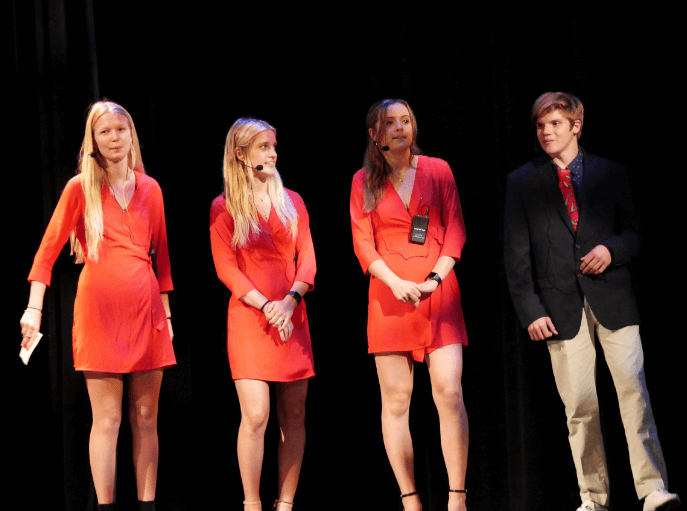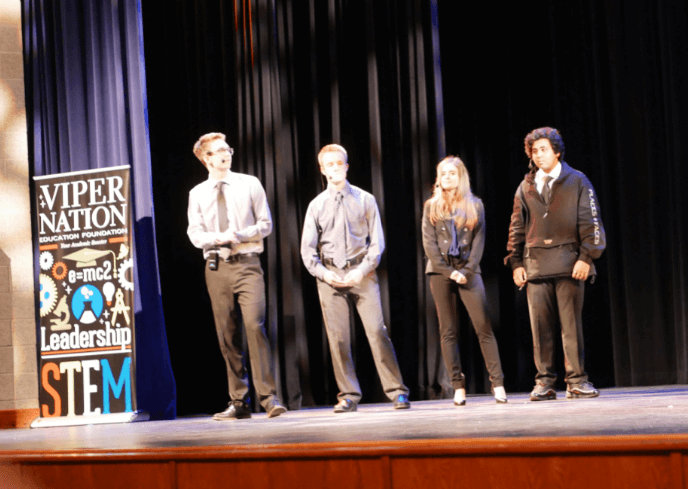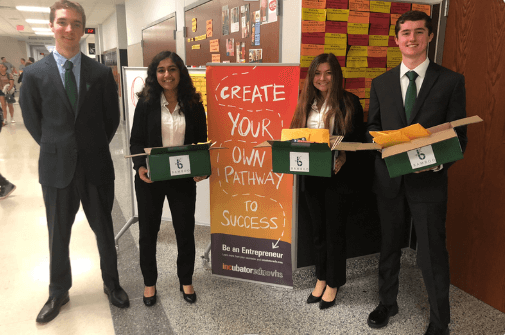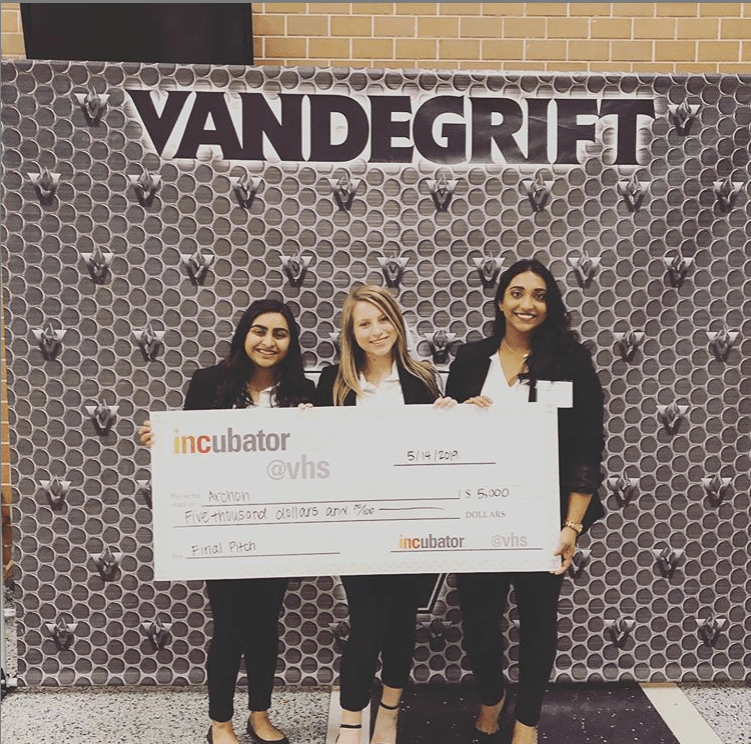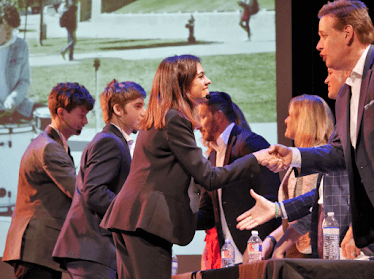
By MIGUEL BLANCO, MEGAN MESSER
Vandegrift Voice
Twenty one Vandegrift INCubator teams pitched in front of five judges from the community – Kristin Spindler, Gene Arant, Shane Stevens, Kristen Huguley and Kai Lamb – on May 10. The judges chose four final teams to present at “Final Pitch Night” on May 14 in the Performing Arts Center at VHS.
“In addition to those teams presenting, all of the other 17 teams showcased their business ideas in an expo prior to the actual pitch performances,” said Erin Lucas, VHS INCubator teacher. “All of the attendees were allowed to vote on their favorite of the 17 teams showcasing. The winner of the “People’s Choice” got to pitch on stage with the four others.”
All five teams competed for $12,000 that was given away for the students to establish their businesses in the second year of the program, ACCElerator. All five teams were awarded funds. In addition to the five teams, one other team was privately invested in on, Lucas said.
Archons, consisting of Akshita Boddapu, Ashiqa Momin and Sophia Gilbert, was the top team and won $5,000.
These three teams tied for second place and were awarded $2,000 a piece: Bamboo Box (Aditi Rao, Keeton Fields, George Young, Vanessa Zon); RetroBox (Declan Maguire, Natalie Ohlsen, Cameron Segura, Rohan Malik); and RiffSwap (Izabela Coto, Nicholas Huft, McClellen Smith).
Troca (Macy Livingston, Lexie Papadakis, Savanna Thate, Luke Merchant) was the People’s Choice winner and received $1,000.
Raw Essence (Chase Demming, Audrey Leeper, Sarah-Kaye Thurston, Dane Kveton) received $1,000 in private investment money.
Student reaction
“We were excited whenever we found out [we were among the finalists],” incoming senior Vanessa Zon said. “It felt good, we were very proud of each other and we were excited to be pitching with all the other teams too, because we knew the teams up there definitely worked the hardest out of everybody.”
Zon is a member of Bamboo Boxes, a company that produces boxes that contain puzzles which are intended to foster creativity and problem-solving skills. Bamboo Boxes’ goal as a company is to present children with activities that challenge their minds in ways that schools do not.
“We went through a lot of businesses,” Zon said. “Our final idea came from the fact that [fellow founder] Keeton Fields’ mom is a QUEST teacher, which got us thinking about making some sort of STEM box originally. We looked at the market and realized there were a lot of STEM boxes, so we decided to kind of veer towards the skills that aren’t necessarily addressed in schools.”
Bamboo Boxes proved to be one of the more successful startups out of all of the teams in the INCubator classes. Following a successful MVP (minimum viable product) pitch, the company was able to garner support after conducting research with children at local elementary schools.
“We spent probably 20 hours between Friday when we found out [about the final pitches], and Tuesday night.” Zon said. “We were able to go back to River Place Elementary for more marketing stuff, so we ended up spending a lot of time preparing, but it was worth it.”
The final five startups pitched on the PAC stage in mid May in front of a crowd of fellow students and parents.
Teacher feedback
“I think the thing that separated the teams the most was that everybody had done a lot of stuff, but [the finalists] took it to the next level,” VHS INCubator teacher Erin Mathis said. “They went out there and learned code to make their websites or they went out and tested their market and talked to their audience. It was great seeing that we had that much support from parents and students and people in the community, it made me feel really happy.”
Grad to try idea at college
Recent VHS graduate Cameron Segura was one of the founders of RetroBox, a company that also delivered their final pitches in front of the judges. Out of all of the INCubator startups, Retrobox was the first company that was able to attract paying customers. Retrobox is a subscription based service which delivers vintage clothing at a low price to its customers.
“When we started off we couldn’t think of an idea,” Segura said. “Our mentor Mr.Gabbi was having us brainstorm our ideas and he really told us to look at all of the different things that we’re interested in to try to find something that we had in common. So we realized that everyone in our group had a similar interest in fashion and streetwear so that’s kind of where the idea of vintage clothing came from. We were just really motivated because we wanted this to be a successful business, and we realized that the best way to test the market was to actually just go live and try to get customers and feedback to learn more. That’s why we were the first to go to market.”
Segura will be attending the University of Indiana and wants to introduce the company to the students on campus in order to broaden their market and progress as a startup business.
“I think we’re going to spend the majority of the money [we received] with upgrading our website and the technology behind everything,” Segura said. “Eventually we want our whole system to be better so that the customer can have a better experience.”
Looking ahead
With the first year of INCubator complete, Mathis will be looking to include the finalists of this
year’s competition as mentor’s for next year’s startups.
“Well we’re going to be bringing in some of the kids that were funded this year, and they’re going to be mentoring an INCubator team next year,” Mathis said. “It’s been great watching these kids go in and take ownership over something, and the hard work that they put in. It’s neat because in other classes you don’t usually give complete ownership to the students, they had to go out on their own and make decisions on what they had to do. Watching them mature this year has been really amazing.”
Lynette Haaland contributed to this article.
